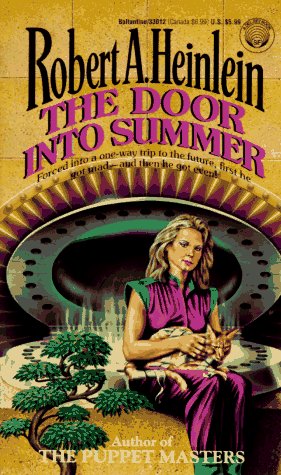
[ad#books]
[starreview]
Classification: Future Reality
Set in “future” 1970 (as the book was written in 1957), The Door Into Summer introduces us to Dan Davis, one of the greatest electronics engineers alive. Dan’s latest invention is a sophisticated household robot which will dramatically change life for the housewife at home. [Note though this was publishable in the 50s, I doubt anyone would write things like that today]. Just before he is able to enjoy the fruits of his labor, Dan is tricked by his business partner, Miles, and fiancee out of business. Even worse, the two betrayers inject him with a drug and put him in suspended animation for 30 years.
30 years pass, and Dan wakes up – penniless and feeling betrayed. Determined to make a new life for himself, Dan starts catching up on new technologies and finds a job. However, he never forgets the betrayal. And so, because the engineer in him never sleeps, he eventually manages to build a time machine – which he decides he’ll use to get back in time and exact revenge on the two people who have stuck the knife at his back.
The Door Into Summer is considered by many to be one of the finest time travel novels ever written. Honestly, I think it is a good novel, particularly when one considers the year it was written in, but I don’t think it meets the higher standards by today’s science fiction novels: The story is decent, but nothing spectacular.
As for character development, well, one of the common problems with science fiction books written in the 50s and before is character development. Although to some extent it is a problem today as well, it seems that back then creating believable characters was never an important consideration when writing science fiction. The Door into Summer is a perfect example: the characters are all exaggerated cliches of the role they play. If this were the goal then that could be fun, but it’s so clearly not the intention.
Note that one of my favorite aspects of this book – and all older science fiction – is seeing the futures they envisioned, and how they differ from the real world. In this book, the future was 1970, and the far future was 2001. Although we’re already 8 years after 2001, we still do not have robots that do everything, nor do we have suspended animation or self driving cars (at least we’re getting closer to those!), and that sort of thing. Yet we do have amazingly complex computers, we have the internet, we have stem cell research, we have iPods and HD Television – and plenty of other things that could not have been predicted back then. Anyway, I digress – this is just an anecdote I find interesting.
To summarize: if you like golden age science fiction, you’ll love this novel. But if poor characterization or old science fiction irritates you – skip this one. Just remember – you may be missing out!
Link to the book’s details on Amazon.com
If you’ve read this book, please vote below:
This is my favorite book of all time.
I’m afraid that you’re mistaken there. Dan did not “build a time machine.” Instead, he hooks up with a Dr. Twitchell, who had built a machine that sends subjects either into the past or the future – with a 50% probability either way. I” know, it’s a fairly minor quibble.